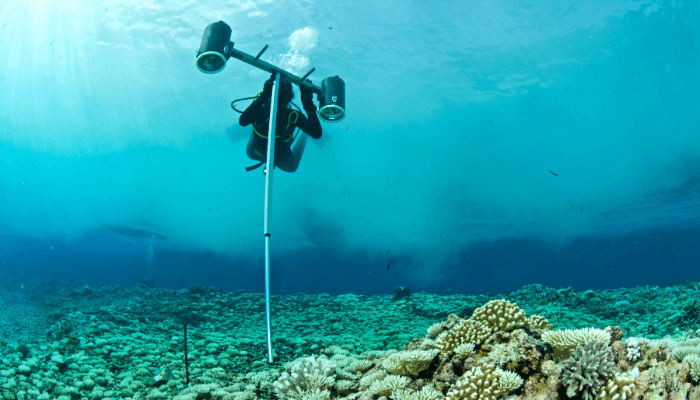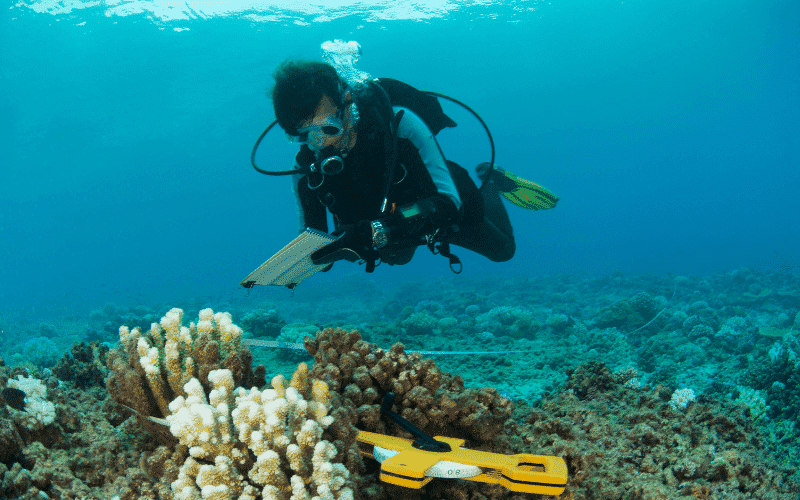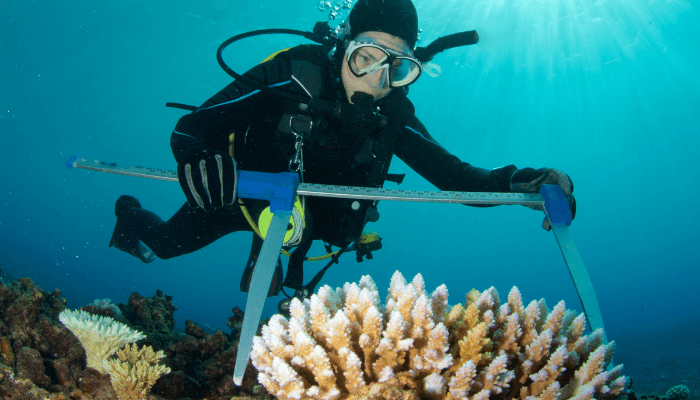How to Become a Marine Biologist: Requirements and Necessities
Studying for a marine biologist career involves specific requirements and following many protocols. Since a degree in marine biology allows a person to gain knowledge about marine fauna and flora, getting an education in the field involves a lot of steadfastness and dedication to not only complete the necessary qualifications but also come out as a professional and dedicated marine biologist.
It is a long and arduous journey to becoming a respectable marine biologist. To take up marine biology, one must choose subjects such as mathematics, physics, chemistry and biology during your undergrad years. A degree in marine biology is the safest way to reach your career goals.

You will be able to learn all the necessary subjects surrounding marine biology, which involves zoology and other aspects of biology. Your life as an undergrad biology student will already give you an idea of how arduous the journey will be.
Also additionally, a person aspiring to take up marine biologist education must be proficient in terms of his writing and communication skills.
Writing skills are relevant in the context of a marine biologist education because a marine biologist must draft extensive notes and observations about the area he is studying and researching so that others also learn crucial and significant things from the same.
Responsibilities of a Marine Biologist
Marine biologists have various roles and responsibilities in management and leadership. They have to manage agencies and oversee that the environmental regulations are being followed regarding the ecosystem in question. They must formulate proposals to receive funds for research and fieldwork, not to mention scientific papers. They also have to do many internships and monitor the natural habitats of endangered species and marine mammals like dolphins and seals.
They must present their findings at conferences in front of stakeholders and policymakers. They are responsible for making people aware of the impact of human activities on marine animal behaviour, issues like climate change and excessive fishing.

Marine Biologist Degree
An important thing to consider while taking up a marine biologist degree is the university that offers marine biology courses. When choosing a university, the candidate must look out for universities that provide practical training and the necessary theoretical know-how.
A marine biologist must pursue vigorous education to become eligible to work. The starting point for any student who intends to choose this career path is an undergraduate or bachelor’s degree. As an undergrad, you can pursue biology or zoology or choose marine biology.
It isn’t necessary that you must choose marine biology during your undergraduate years to become a marine biologist. It is also advisable for undergrads to pursue engineering, mathematics or computer science courses in addition to natural science education. These subjects can assist your career greatly and give you more options to apply in various situations.

Students that pursue a biology program will study subjects such as cell biology, biochemistry, ecology, evolution, etc. They will be able to choose elective courses that can help them learn about subjects related to their majors, like marine zoology or marine ecology. Biology programs also rely heavily on laboratory practicals. This will give the students experience working with lab tools, conducting correctly in a lab environment, and following research protocols.
Graduates with bachelor’s degrees in marine biology can find jobs, but career advancements require higher education.
Students will also fail to keep up with their more educated peers unless they put in the extra effort. Pursuing a master’s degree is a wise choice for students to gain confidence in the subjects’ proficiency.
Oceanography, biostatistics, marine chemistry, ecosystems and geology are some choices that can help students specialize in their field of study. The master’s programs will also have electives to choose from, which can further help the students improve their skills.
They will also be able to specialize in their subjects of interest like particular marine organisms, for example, fish, mammals, corals, and other marine wildlife. Graduate students must also focus on independent research and coursework for their thesis and publish scientific papers. This will act as the gateway to their journey as marine biologists.
Research and documentation are two essential requirements for a scientist. Later, students may even opt for PhD programs to further develop their research skills and knowledge. A PhD is not necessary, but having one is very commendable, and the quality of your dissertation will significantly influence your potential employers.
Marine Biologist Jobs
Some of the critical organisations that hire marine biologists in the United States are:
- NOAA: National Oceanic & Atmospheric Administration
- Fisheries and Oceans Canada
- California Department of Fish and Wildlife
- Florida Fish & Wildlife Conservation Commission
- NYS Department of Environmental Conservation
- EnviroMatrix Analytical, Inc. (EMA)
- AquaBio Environmental Technologies, Inc. AquaBio Environmental Technologies, Inc.
- Nautilus Environmental
An individual can look up similar organisations in their respective country to know more about opportunities for marine biologists.
Different Career Options After Pursuing Marine Biology
After gaining an education in the field of marine biology, one can take up different kinds of jobs, as mentioned below:
- Marine ecologist and dive operations manager
- Consultant in marine ecology
- Marine biotechnologist
- Fishery data manager
- Environmental engineer
- Marine policy expert.
- Reef restoration project manager
- Marine biology technician
- Research Assistant
- Professor in marine ecology
- Postdoctoral fellow
- Oil spill response specialist
A marine biologist has several career options, all of which can provide fruitful compensation and great satisfaction from work. However, to advance in the career domain of your choice, you will need to specialise in a particular field. Reef ecology ( studying coral reefs), fisheries biology, marine pollution, molecular biology, biodiversity, marine science, ethology ( studying the behaviour of deep sea creatures) and coastal management are some of the popular choices for a marine biologist to specialise in.
Your success as a marine biologist depends entirely on your experience and achievements within the field of choice. Education only plays a partial role by helping you break your way into the area. Like other scientific careers, a marine biologist can expect tons of competition. Hard work and commitment are the only answers to success in this field.
Marine Biologist Education Requirements
As mentioned earlier, a marine biologist does not have a specific blueprint for education requirements besides a bachelor’s degree in a related science. Further education will be a bonus and add more value to the biologist.
Best Marine Biology Colleges
Some of the famous colleges providing courses in marine biology are:
- Duke University in Durham, NC
- ETH Zurich – Swiss Federal Institute of Technology
- Boston University in Boston, MA
- The University of Maine in Orono, ME
- The Australian National University
- University of Cambridge
Important Books for Marine Biologists
If you are a marine biologist or are planning to become one, then the following books would be beneficial:
- The Unnatural History of the Sea – Prof. Calum Roberts
- Mapping the Deep – Robert Kunzig
- Spirals in Time – Dr Helen Scales
- Vanished Ocean: How Tethys Reshaped the World – Prof. Dorrik Stow
- The Empty Ocean – Richard Ellis
- Voyage of the Turtle: In pursuit of the Earth’s last dinosaur – Prof. Carl Safina
- Reflections on a Summer Sea – Prof. Trevor Norton
- Narwhals: Arctic Whales in a Melting World – Todd McLeish
- Flotsametrics and the floating world – Dr Curtis Ebbesmeyer & Eric Scigliano
- A Life Underwater – Dr Charlie Veron
Marine Biologist Salary
Though there is no detailed data on the salary of marine biologists around the world, according to payscale.com, marine biologists across different levels have a salary range as mentioned below:
Entry-level
Experience plays a huge role in the success of your career as a marine biologist, but your early days will not have a low salary either. An entry-level marine biologist with less than five years experience can expect an average salary of $49,000. This is a significantly high amount to earn for someone starting their way on the field. You can make more with overtime work, extra projects, etc.
Mid-level
A marine biologist that has been in the field for more than 5 to 10 years can expect an average salary of $51,000. This isn’t all that different from the average entry-level salary, but you can find plenty of top companies that pay higher than this amount. You will easily find more demanding work if you have the talent and achievements.
Experienced
An experienced marine biologist with 10 to 20 years of work experience can expect an average salary of $60,000. This is also relative to your achievements and the company you work for.
Frequently Asked Questions
1. What exactly does a marine biologist do?
A marine biologist studies and observes marine life in their natural habitat. They also assess their living conditions, record their physiology and behaviours, and the human impact on their lives and ecosystems.
2. Are marine biologists paid well?
Marine biologists are well-paid in many countries of the west. An entry-level position can get an average total consumption of 250,000 dollars, including bonus, overtime pay, tips etc. Marine biologists make the most in San Francisco, California.
3. What are the disadvantages of being a marine biologist?
The job of a marine biologist pays well. However, it is very demanding and also dangerous. One should be physically fit and know how to deal with marine species. It requires stamina to operate heavy equipment, dive deep waters and examine marine animals.
4. Who is known as the first Marine Biologist?
Aristotle was the first person to record his observations on marine life. Hence, he is called the father of marine biology and the world’s first marine biologist. Charles Darwin is also considered one of the first marine biologists as he studied coral reefs extensively, which helped to develop his initial ideas about natural selection and evolution.
5. What is the demand to be a marine biologist?
Marine Biologist is not a popular job in most developing countries which do not undertake marine research. However, it is a prominent position in western nations like the UK, the US and Europe. According to the U.S Bureau of Labour Statistics, the employment of zoologists, marine biologists and wildlife biologists can be expected to increase by 5 per cent between 2020 to 2030.
You might also like to read.
- Choosing the Career of Marine Biologist
- A List of Unique and Interesting Marine Careers
- Top 10 Marine Biology Books You Must Read
- Ocean Engineering: Education, Colleges, Jobs And Salary
- The Unexplained Mystery of the Sea Serpent
Disclaimer: The author’s views expressed in this article do not necessarily reflect the views of Marine Insight. Data and charts, if used in the article, have been sourced from available information and have not been authenticated by any statutory authority. The author and Marine Insight do not claim it to be accurate nor accept any responsibility for the same. The views constitute only the opinions and do not constitute any guidelines or recommendations on any course of action to be followed by the reader.
The article or images cannot be reproduced, copied, shared or used in any form without the permission of the author and Marine Insight.
Do you have info to share with us ? Suggest a correction

About Author
Zahra is an alumna of Miranda House, University of Delhi. She is an avid writer, possessing immaculate research and editing skills. Author of several academic papers, she has also worked as a freelance writer, producing many technical, creative and marketing pieces. A true aesthete at heart, she loves books a little more than anything else.
Latest Marine career Articles You Would Like:
Subscribe To Our Newsletters
By subscribing, you agree to our Privacy Policy and may receive occasional deal communications; you can unsubscribe anytime.
















Im Researching the Steps And Proceedures To Take On this Profession
Any Recommendations for what i Can be doing as a Young teen going through High School ?
I really like your writing style, good information, regards for putting up this article
I am 15 years old and I always wanted to be a marine biologist I’am in school now 9th grade I found this cite really use full thank you your information in amazing but I want to know how I can go to school to be this thank you from ryan spano
I would really want to do marine biology but I don’t do maths I do maths literacy so how would I do marine biology
I am 15 years of age, always wanted to study marine biology, next year I will be in yr 11 and have the opportunity to pick those subjects and hope I succeed to study in university, I was wondering if marine biologist have specific safety requirements? if so, what are they or what website could I go to to find it?
I Jaco van Staden want to become a marine biology. Please is there some one to help me study for free. I am a hardworking person and this is my biggest dream my whole life.
I can start immediately. Please help me.
Thank you kindly
Jaco van Staden
Thanks for one’s marvelous posting! I truly enjoyed reading
it, you happen to be a great author.I will remember to bookmark your blog and will often come back in the
foreseeable future. I want to encourage you to continue
your great posts, have a nice holiday weekend!
At tuks if my daughter moves towards marine biology she does all the necessary subjects going into G10 she loves french and will add to matric would she gets points for this subject
I’m in grade 12 and I’m in wrong class which is social science but I use to do Biology,Geograpy and Mathamatics without chemistry and physics,,,but I like this course(marine biology) ,,it able also to qualify in this carreer?
I Annanias Daniel want to become a marine scientist. I obtained high marks in all my subjects required but I did not get a loan to go study. Anyone to assist me with a bursary ? Since this is my biggest dream,I cannot give up on it.
Hey, my name is Jonathan Eby, I don’t know if you are still responding to this article or not, but I am becoming more and more interested in marine biology. I am currently in my sophomore year of college with a major in intercultural studies and a minor in environmental justice. However, I am having doubts about where i am currently heading. I grew up overseas in Dakar, Senegal as a missionary kid. I always loved going to the beach and swimming in the ocean (even went snorkeling a few times), and I always did well in my math and science classes. I came into college not really knowing where i was heading, but now looking back I wonder if this might be a worthy career choice. After learning more about how unexplored and how important the ocean is, along with my love of life, traveling, and adventure, it sure has become an exciting consideration. I found this article to be the most enlightening for what would lie ahead if I chose this path. What specific action(s) could I take now that would make or break my decision?
I need to know the age restriction
I was 9th grade when i first heard about this career path. I didnt know much about it but every time I was asked what i want to be in life, id reply by saying I want to become a marine biologist and so as i kept saying it , i became more serious about it. I did three of the required subjects and failed them not because i dont get science but due to some family issues i couldnt handle on my own. Anyways i am going to do all four subjects this year including the ones i faled and one other. This career path is calling out to me and i am determined to find out why.
A perfect way to get hands on field experience would be to take part in a Marine Science Field course opportunity abroad. We offer 2 week and 4 week Marine Science SCUBA Field courses in South Africa. Our students are those who are deciding if they want to take this career path, students who are currently studying and post graduates.
Thanks for this article. It helped me on a boyscout project.
@Clayton: Glad the information came handy to you. ????
I just wanted to say thank you so much for this article . The way it has been written is so helpful and it gives a great sense of reality and yet it also gives hope for the rest of us 😉
# up the good work
-Sarah-Joy Steyn
Wow this really just answered all my questions! And has made me sure of the fact that I definitely want to become a marine biologist. Thank you
I wantbadly to do mbbs and become a gyni r cardic r neuro surgon but now i have a lot of craze about marine scientist its amazing and a differernt ones
Good luck Kisa ??
I like this article, I’m a 2nd year college, I enrolled BS Marine Biology, Marine Biologist, because this will help me to boost my confidence in facing what BIOLOGIST means, and how it helps me to improve my knowledge about SCIENCES AND MATHEMATICS..
SO HELPFUL, I Highly appreciate the information, so informative
.
I really want to be a marine biologist. I have always been drawn to the ocean. Although I haven’t decided on what college I want to go to, I thought this website was very helpful.
Thank you Emily for the kind words 🙂
I’m 18 years old and this has been my dream job the only problem was that I didn’t take the right subjects and my Mark’s are low, is there still an opportunity for me to become any sort of marine biologist, any branches of marine biologist, if there is what must I do. Thank you